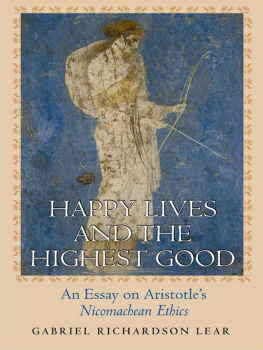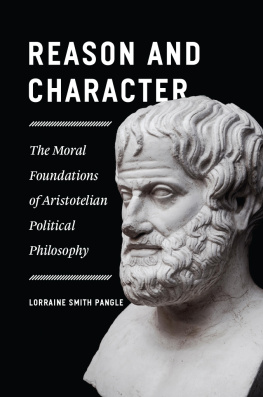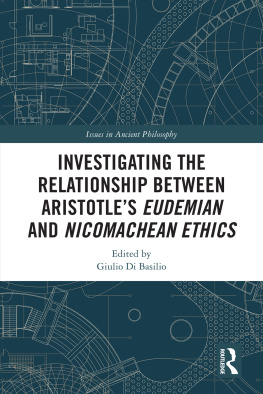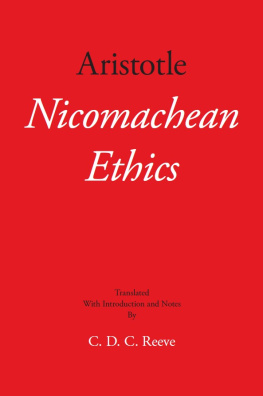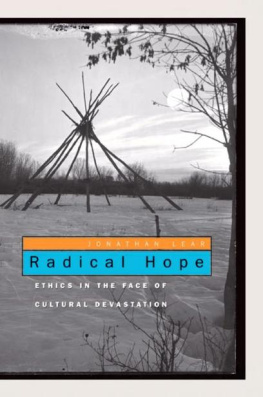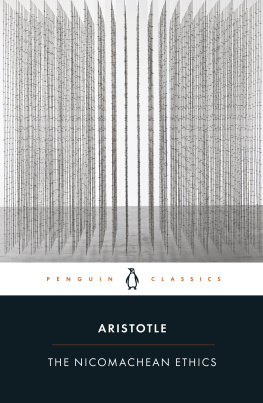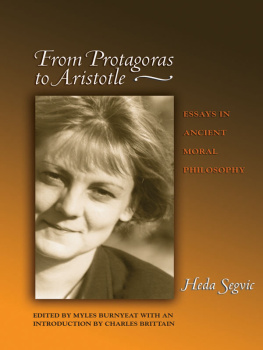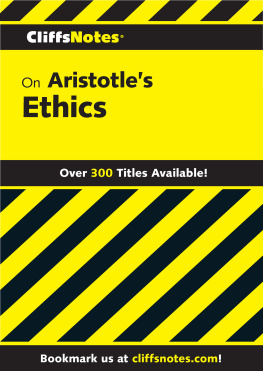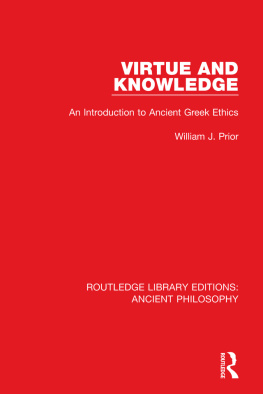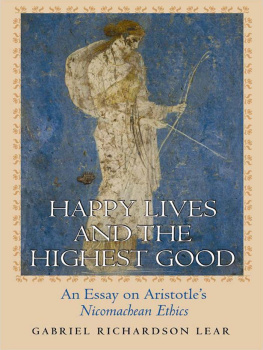Happy Lives and the Highest Good
Happy Lives and the Highest Good
AN ESSAY ON ARISTOTLE'S
NICOMACHEAN ETHICS
Gabriel Richardson Lear

Copyright 2004 by Princeton University Press
Published by Princeton University Press, 41 William Street,
Princeton, New Jersey 08540
In the United Kingdom: Princeton University Press,
3 Market Place, Woodstock, Oxfordshire OX20 1SY
All Rights Reserved
Library of Congress Cataloging-in-Publication Data
Richardson Lear, Gabriel, 1971
Happy lives and the highest good : an essay on Aristotles Nicomachean
ethics / Gabriel Richardson Lear.
p.cm.
Includes bibliographical references and index.
ISBN 0-691-11466-8 (alk. paper)
1. Aristole, Nicomachean ethics. 2. Ethics, Ancient. I. Title.
B430.L43 2004
171.3dc212003042899
British Library Cataloging-in-Publication Data is available
This book has been composed in Sabon and American Gothic
Printed on acid-free paper.
www.pupress.princeton.edu
Printed in the United States of America
10 9 8 7 6 5 4 3 2 1
FOR MY PARENTS
Dale and Leslie Richardson
Contents
Acknowledgments
MANY PEOPLE HAVE HELPED ME think and write about the material in this book, though whether I have made good use of their advice is for them to say. My former colleagues in the Yale philosophy department have been generous both in general support and in commenting on drafts of chapters 4 and 5. In particular, I thank Robert Adams, Tad Brennan, and Michael Della Rocca. Stephen Menn offered helpful guidance at an early stage. David Sedley offered useful comments on a draft of chapter 3. David Charles and two other anonymous readers for Princeton University Press wrote especially thorough reports on my submitted manuscript. I have learned from them and hope I have managed to go some way toward answering the problems they raised for my argument.
This book began as my Ph.D. dissertation at Princeton University. I am grateful for my time spent there. The intense conversations in seminars that spilled out afterward to the Annex made it a happy initiation into the life of philosophical leisure. In particular, I thank the members of the Philosophy Department Dissertation Seminar 19992000 and the members of the University Center for Human Values Mellon Graduate Seminar 19992000 who read and commented energetically on earlier versions of chapters 2 through 4. I also thank my fellow graduate students working in classical philosophy, in particular Jonathan Beere, Ursula Coope, and Zena Hitz. Alexander Nehamas is a teacher to whom I owe much. And I thank Christian Wildberg for his helpful comments as a reader of my dissertation.
But above all, I thank my former advisers, John Cooper and Sarah Broadie. The countless hours they spent talking me through my ideas and writing meticulous comments on drafts have made this a better piece of work than it would otherwise have been. But more than that, they have been models of scholarship and philosophical insight to which I aspire.
I wish also to thank my husband, Jonathan, who has encouraged me every step of the way; Sophia Lear for being full of poise and warmth in the midst of frenzy; my sisters, Leslie and Dana; and my parents, who encouraged me from the beginning to be a philosopher.
Happy Lives and the Highest Good
CHAPTER ONE
Introduction
ARISTOTLE INVITES US to conceive of the human good as a special kind of end (telos). In the very first line of the Nicomachean Ethics (NE) he says, Every craft and every inquiry, and likewise every action and every choice, seem to aim at some good; for which reason people have rightly (kals) concluded that the good is that at which all things aim (1094a13, my emphasis). He calls this ultimate goal of the successful life eudaimonia, or happiness (1097a2834). Just as an archer aims at a target, so, Aristotle thinks, the happy person aims at the human good in everything he does (1094a2224). In effect, he proposes that we think of happiness not as the property of being happya certain feeling of contentment or satisfactionbut as the goal or end for the sake of which the happy person acts. Aristotles investigation into happiness is thus decidedly practical. Not only does he want to arrive at a theory of happiness that will actually help us to live well, his investigation is guided by the thought that happiness is the ultimate object of rational desire and action. If we know what a good must be like in order to serve as the end of all of our rational pursuits, then we can use those criteria to evaluate goods, such as pleasure, wealth, honor, moral virtue, and philosophical contemplation, which people have at one time or other taken to be keys to happiness.
Notice that for Aristotle the happy life needs to focus on a single kind of good. Throughout the Nicomachean Ethics he envisions the happy life as a life of devotion to a single supremely valuable thing (or kind of thing). This is the natural way to read the first book of the Nicomachean Ethics.In NE I.45 Aristotle considers whether lives characterized by the pursuit of pleasure or wealth are happy, and he criticizes the idea that honor or moral virtue is the good at which the political life aims, apparently as a preliminary to supplying his own account. Then in NE I.7 he argues that the highest good must be activity in accordance with virtue, and if there are several, in accordance with the best and most final (1098a1618). It is natural (although certainly not necessary) to interpret Aristotle as saying here that happiness, the ultimate goal of the happy life, is a single kind of virtuous activity, that is, it is a monistic good. When we reach the final book of the Nicomachean Ethics, the impression that happiness is a single kind of good for the sake of which the happy person makes all his choices is even more pronounced. In NE X.7 Aristotle argues that the happiest life is one in which the agent does everything for the sake of philosophical contemplation (1177b33 34).And in NE X.8 Aristotle allows that a life lived for the sake of morally virtuous activity (another monistic good) is also happy, though in a lesser sense (1178a922). Most readers are surprised, of course, when they discover that Aristotle thinks the happiest life is lived for the sake of contemplation. The lengthy discussions of moral virtue and friendship and Aristotles evident admiration for the morally virtuous person lead most people to assume that, according to Aristotle, the human good is the exercise of practical, and not theoretical, virtue. What is not surprising (or at least ought not to be) is that, according to Aristotles considered opinion, the happy life aims at a monistic good.
But although there is ample evidence, I believe, that Aristotle thinks of happiness as a monistic end in the Nicomachean Ethics, many, if not most, recent interpreters deny that this is what he has in mind. Instead, many scholars believe Aristotles eudaimonia is (or ought to be) a set that includes some or all intrinsically valuable goods. As I understand it, the motivation behind these various inclusivist interpretations is not so much that various particular passages require it, as thatdespite the evidence that Aristotle does conceive of eudaimonia as a monistic endthe overall theory of the

